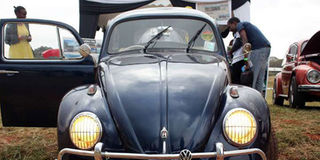Volkswagen to reopen assembly in bid to improve economy

A Volkswagen Beetle at the CBA Africa Concours d' Elegance at Ngong Racecourse in Nairobi on September 25, 2016. PHOTO | DENNIS ONSONGO | NATION MEDIA GROUP
What you need to know:
- This time, the plant will initially produce the VW Polo Vivo model, moving it closer home from its production line in South Africa.
- Volkswagen said earlier in the year that it is expanding in Africa to reap from the untapped market.
President Uhuru Kenyatta is expected to reopen the Volkswagen assembly plant in Thika next week in what State House said indicates Kenya’s improving business environment.
The opening of the plant on Wednesday, which had been announced early this year, will mean that the German car maker is returning to assembling cars in Kenya since 1970s when it used to manufacture the Beetle model.
“It is evidence that we have put in place the right policies and are promoting the right environment for industry to grow, for business to grow, for jobs to grow,” President Kenyatta said in a statement released by State House on Sunday.
This time, the plant will initially produce the VW Polo Vivo model, moving it closer home from its production line in South Africa.
“Part of the strategy is to develop affordable, innovative financing packages with local banks that will expand the new market significantly,” State House Spokesman Manoah Esipisu said.
“While the intention is to start operations on a small scale with the Polo Vivo, the production facility is designed to be flexible to include production of additional models such as the luxury brands, SUV (sports utility vehicle) Tiguan and the Passat.”
REDUCING COST
The German firm is re-entering Kenya at the time other car makers, mostly cheaper Japanese models like Toyota, Mitsubishi, Isuzu and Nissan already assemble cars on Kenyan soil.
In fact, Kenyans predominantly use second-hand imports from Japan or the United Arab Emirates.
Volkswagen said earlier in the year that it is expanding in Africa to reap from the untapped market.
On June 2010, President Uhuru Kenyatta - then Deputy Prime Minister and Minister for Finance - ordered all government officials to use vehicles whose capacity did not go beyond 1800cc.
The policy, which aimed at condensing government spending by reducing fuel usage, saw the State choose the VW Passat as the preferred car for ministers.
But the programme would later be blatantly flouted by government officials.
The president will be accompanied by Volkswagen CEO, Dr Herbert Diess.





